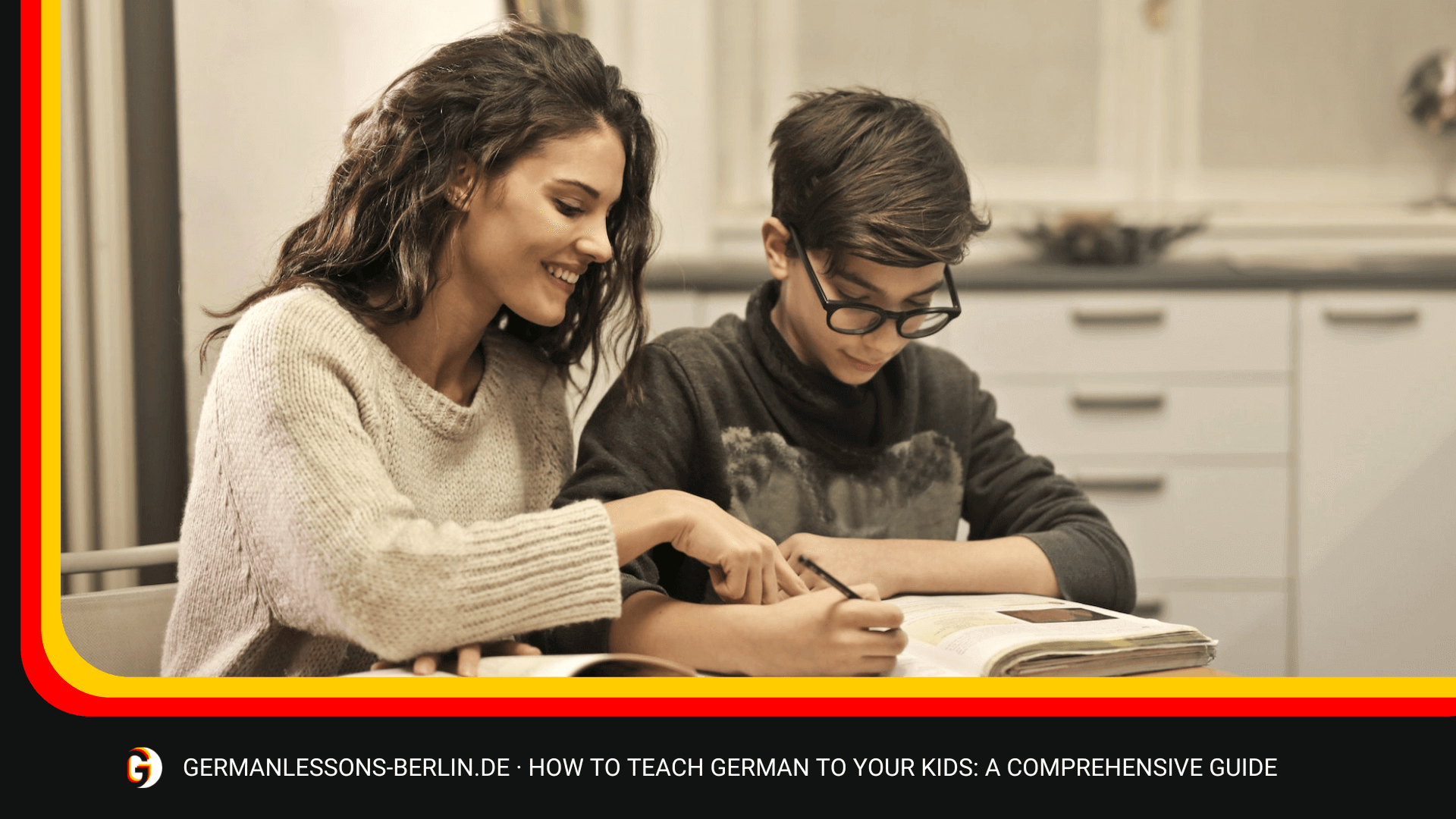Do you want to give your kids the gift of learning a new language? German is an excellent choice! With its rich culture and vast history, it’s sure to captivate their interest. But how can you teach them such a complex language? Don’t worry—we have all the tips and tricks for teaching German to your children in our comprehensive guide!
You don’t need any prior experience or special skills to start teaching German. Our guide breaks down every step of the process into easy-to-follow instructions so that anyone can do it. We also provide plenty of innovative ideas for making learning fun and engaging for kids. So if you’re ready to take on this exciting challenge, let us help you get started!
With our guidance, you can turn your little ones into well-rounded global citizens with a working knowledge of German. So join us as we explore the wonderful world of language education and discover what makes teaching German to your kids both enjoyable and rewarding!
Table of Contents
Benefits Of Learning German
Learning German can be incredibly beneficial for kids and adults alike. Not only does it open the doors to a world of opportunities, but it also provides an invaluable understanding of culture and language that is essential in today’s globalized society. From increasing job prospects to improving communication skills, there are numerous advantages of learning German that should not be overlooked.
The value of German lies within its versatility – as one of the most widely spoken languages in Europe, having a basic knowledge of it gives access to some of the continent’s most important countries and cultures. Having conversational fluency expands educational and employment options dramatically across various industries such as technology and finance. It also enhances social mobility by making it easier for people to communicate with those from different backgrounds or areas.
In addition to all these benefits, being proficient in German encourages creativity, critical thinking, and problem-solving abilities which are necessary for success both inside and outside the classroom. With so many incredible reasons why knowing German is advantageous, parents may find themselves asking how they can teach this amazing language to their children? Choosing a methodology that suits each individual child’s needs is key…
Choosing A Methodology
Choosing the right methodology to teach German to your kids is essential in making sure they receive a comprehensive education. There are various methods and approaches that you can use, depending on what works best for your child’s learning style and needs. Here are some key points to consider when choosing a methodology:
- Begin by assessing the language level of your children; this will help determine which method is most appropriate for them.
- Consider using an immersive approach if possible – having conversations with native speakers or watching movies/TV shows in German can be very effective in introducing new words and phrases.
- Incorporate fun activities such as games, music, stories, role-playing and other interactive elements into lessons to keep them engaged and motivated.
- Establish clear expectations from the beginning (e.g., how much time should be devoted each day to practicing German) so that everyone involved knows what is expected of them.
- Make sure there are plenty of opportunities for feedback throughout the process – both positive and constructive criticism can go a long way towards helping your kids improve their understanding of the language.
By taking all these things into consideration, you’ll be able to choose a suitable methodology for teaching German to your children that will ensure they get the most out of their experience. Additionally, it’s important to remember that establishing a strong foundation early on is essential in setting up success later down the road! With the right resources and tools at hand, you’ll be able to provide your kids with an enriching environment where they can learn, grow and explore the intricacies of the German language.
Learning Resources
I’m sure you’re eager to get started on helping your child learn German. To help them along their journey, there are a variety of resources available that can make learning the language fun and engaging. Let’s look at some of these together:
| Resource | Description | Benefits |
| German-learning books | Books designed specifically for children to introduce them to the basics of the German language such as vocabulary, reading, writing and conversation. | Provides structure and guidance through step by step instructions in an accessible format. Easy to find at local bookstores or online retailers. |
| Online German Resources | Websites dedicated to teaching German with interactive games, videos and activities for all ages. | Allows learners to practice at home with convenience; can search for specific topics quickly. Some sites offer free access or have paid subscription options. |
| German Language Games | Games provide a fun way for kids to interact while also learning important aspects of the German language like pronunciation and grammar rules. Examples include quizzes, flashcards and puzzles. | Engages learner actively instead of passively; offers immediate feedback when taking tests so user knows how they’re doing right away; helps build confidence in speaking & understanding ability without fear of judgement from others. |
| German Language Apps | Mobile apps featuring lessons on various subjects related to the German language such as vocabulary building, listening comprehension and verb conjugation drills. Most have audio recordings enabling users to listen & repeat phrases correctly too! | Can be used anytime/anywhere – great for busy parents who need flexibility; provides opportunities to practice over time which is essential for mastering any foreign language; often includes progress tracking capabilities that allow users to measure their own improvement against set goals easily & accurately . |
| German Learning Videos | Videos created especially for those looking to study the German language – ranging from tutorials introducing basic concepts all the way up more advanced material covering complex grammar points & cultural insights too! Great way for anyone intimidated by traditional methods (books/classes) start out slowly & comfortably until they gain enough confidence tackle more challenging tasks later on down line if desired. |
With all this information at our fingertips now, let’s discuss ways we can nurture a positive attitude towards learning within our children so they can reap maximum benefit from these incredible resources!
Nurturing A Positive Attitude
As the saying goes, “A positive attitude leads to a positive outcome.” The same holds true for teaching German to your kids. It is not only important to provide them with learning resources such as books and websites, but also essential to nurture their overall attitude towards language development. Here are some tips on how you can cultivate a strong and positive approach for your children when it comes to learning German.
First, create an encouraging environment where mistakes are seen as opportunities for growth instead of failures. Show your children that making mistakes is normal and part of the process in mastering any skill or subject matter. This will help build their confidence and motivate them to keep trying until they get it right. Furthermore, show interest in what they learn by asking questions about what they have learned so far or if there is anything new they want to try out. Doing this shows them that you care about their progress and encourages further exploration into German language development.
Second, use motivational strategies regularly such as providing rewards or offering praise whenever they complete tasks related to their German studies or make progress in their understanding of the language.This can be something simple like giving them extra screen time after finishing assignments or taking them out for ice cream as a reward for passing exams. Utilizing these tactics helps boost morale and increase motivation levels which ultimately translates into better results in terms of performance and comprehension when it comes to kids learning German.
Finally, establish clear expectations from the beginning; let your kids know exactly what is expected from them when it comes to studying the language so there’s no confusion down the line regarding goals or objectives set forth at the start of their journey into German fluency . Additionally, set aside dedicated times throughout each week specifically allocated for working on their German lessons – this routine will help turn study sessions into habits while ensuring continual progress over time without feeling overwhelmed along the way..
Establishing Routines And Schedules
When it comes to teaching German to your kids, establishing routines and schedules is key. It can be difficult for children to carve out time in their day specifically dedicated to learning a language – especially if they are still trying to learn other subjects at the same time. That’s why having a structured plan helps keep them on track and ensures that you stay consistent with their German lessons. Here are some tips for creating an effective routine:
- Plan ahead: Take the time to map out what days and times work best for both you and your child so that everyone knows when the lesson will take place each week.
- Break up content into manageable chunks: For example, focus one day on grammar, another on writing exercises, and a third on conversational activities. This way, there won’t be too much information being consumed all at once.
- Incorporate fun activities: Games or videos related to German culture can help make the experience more enjoyable for youngsters who may not have as much enthusiasm about formal language instruction.
- Make sure practice happens outside of class time: Homework assignments should reinforce concepts covered during the lesson, providing an opportunity for additional practice and review.
- Track progress over time: Keep tabs on how well your child is doing by periodically checking in with them after each class or session. This will provide valuable insight into what areas need extra attention and which ones they’ve already mastered.
By implementing these strategies, you’ll be able to create an environment where your child feels supported while also keeping things organized so that they get the most out of their German studies. With this comprehensive guide as your foundation, you can rest assured that you’re setting up your kids for success! Now let’s move onto teaching German vocabulary…
Teaching German Vocabulary
Take my daughter, Emily, for example. When I started teaching her German vocabulary, she was enthusiastic and eager to learn. We made it a game; she would try to guess the meaning of each word in English before I gave her the translation. This not only helped with memorization but also made learning fun for both of us!
To get started with teaching your kids German vocabulary words, make sure you have access to plenty of resources like books, flashcards or online apps that are geared towards children’s language-learning needs. Identify which topics could be most interesting for your kid such as animals, sports, or food items and focus on those first. You can then gradually start introducing more complex words related to everyday activities and conversations. Additionally, as much as possible try to immerse them in the language by exposing them to native speakers who they can interact with easily – this will help their pronunciation and intonation significantly.
When introducing new vocabulary words always provide examples so they can better understand the context in which these words might be used and how different tenses work together when forming sentences. Having a few minutes of conversation practice at the end of each lesson is also important because it allows them to apply what they learned right away while having fun at the same time! With dedication and consistency your child will soon become proficient in speaking German fluently.
By understanding how best our children learn, we can create an environment conducive to helping them acquire knowledge in any language efficiently. Moving forward now let’s look into introducing grammar concepts…
Introducing Grammar Concepts
Now that we’ve discussed how to teach German vocabulary, let’s move on to introducing grammar concepts. This can be a tricky area for kids since they may not understand the rules and syntax of the language yet. However, with consistent practice and instruction, their comprehension will improve quickly.
We can start by teaching German grammar using simple games or activities such as word searches or creating rhymes. As children become more comfortable with the basics of German grammar, they can begin to learn specific grammar rules like verb conjugation and sentence structure. Depending on your child’s age, you might want to break down these concepts into smaller pieces so that it is easier for them to comprehend. For example, if you are teaching noun-adjective agreement, explain what an adjective is first before diving into its placement in sentences.
In addition to providing concrete examples through written exercises and verbal explanations, it is important to take time each week to review previously learned material. It is also helpful to use real-world situations when discussing grammar topics; this helps bring meaning and context behind why certain rules exist which makes learning even more enjoyable! With patience and dedication towards mastering grammatical structures in German, your kid will soon be able to understand speech and dialogue better than ever before!
Understanding Speech And Dialogue
Learning to understand speech and dialogue in German is an essential part of teaching your kids the language. To help them comprehend spoken words more easily, you can incorporate a variety of tools into their learning strategy. For example, audio recordings are helpful when trying to distinguish between sounds and get accustomed to accents. Additionally, video clips provide visual cues that allow for better comprehension of the context surrounding conversations. Finally, written materials like books or articles give young learners a chance to familiarize themselves with how native speakers communicate in the language without having to interact with them directly yet.
When it comes to understanding dialogue, activities such as role-playing or storytelling will come in handy. These types of games let your kids practice what they’ve learned about vocabulary and grammar while also encouraging conversational skills. Furthermore, hearing stories told by either yourself or other native speakers helps children differentiate between various dialects and regional phrases used throughout Germany’s many regions. Having these real-life examples gives them confidence during interactions with people who speak German fluently and allows them to learn valuable lessons on communication beyond just the language itself.
By leveraging all the available resources out there – from audio recordings to interactive games – parents have plenty of options at their disposal when helping their kids gain a better command of the German language through understanding speech and dialogue
Encouraging Conversational Skills
Encouraging conversational skills is a key part of teaching German to your kids. It’s essential to help them learn the language in an engaging and comfortable environment. To do this, there are some simple steps you can take that will make it easier for them to practice their speaking skills without feeling overwhelmed or judged.
The first step is to create opportunities for conversation. This could include facilitating small group dialogue or organizing language exchange sessions with native speakers. You can also use fun activities like role-playing games or storytelling as a way of encouraging conversation while learning new words and phrases.
Another great way to get your kids involved in conversational practice is by setting up structured conversations with other family members or friends who speak the language. By doing so, they will be able to gain confidence in their own abilities while having someone else present who knows how to correct mistakes when needed. Additionally, these conversations should focus on topics that interest them and allow them to express themselves freely without any pressure from adults.
| Conversational Practice | Speaking German |
| Facilitating Dialogue | Encouraging Conversation |
| Role Playing Games | Language Exchange |
| Structured Conversation | Expressing Themselves Freely |
In order to foster successful communication between your child and others, it’s important to celebrate successes and progress made throughout the process no matter how small they may seem at first! Through positive reinforcement, children will become more confident in their ability to communicate effectively using a foreign language.
Celebrating Successes And Progress
Moving on from encouraging conversational skills, it’s time to celebrate successes and progress. It’s important for kids to recognize their growth in learning German and be proud of themselves. A great way to do this is through progress tracking, as not only does it give your child a sense of accomplishment but also allows you to monitor their development over time.
In order to maximize the rewards system, establish achievable language milestones with your child that they can strive towards such as memorizing 10 new words or being able to count up to 25. Once these goals are achieved, reward them with something special like a toy or an extra hour of playtime. This positive reinforcement will keep them motivated and eager to learn more!
It’s crucial during this process that you provide consistent praise and encouragement so that your child has confidence in their ability throughout the journey. Furthermore, when possible try introducing fun activities such as word games or craft projects which allow children to make abstract connections while simultaneously reinforcing learned vocabulary and phrases. Remember – celebrating small victories along the way makes learning German both enjoyable and rewarding!
Frequently Asked Questions
How Long Does It Usually Take For Children To Become Fluent In German?
Learning German can be difficult, especially for younger children. It takes time and commitment to become fluent in the language – but how long does it usually take? With the right approach, kids of all ages can learn German relatively quickly.
The amount of time that it takes to become proficient in a new language depends on several factors such as age, exposure and immersion into the language. For younger children who are just starting out with learning German, it is recommended that they receive frequent exposure and practice through activities such as reading books or listening to podcasts in their free time. Additionally, attending an immersion camp can greatly assist in speeding up the process by providing intense instruction over a short period of time. This could lead to fluency within six months or even shorter depending on the child’s level of dedication.
For older students, becoming fluent may take longer due to prior engagement with other languages or lack thereof; however this doesn’t mean it isn’t achievable! By taking advantage of resources such as online courses and engaging native speakers during conversations, teens and adults can pick up the German language at a much quicker pace than one might expect. Regardless of age though, everyone should remain patient and consistent when learning any language – practicing a few hours each day will undoubtedly result in progress made over time leading towards full fluency in no time!
At What Age Should I Start Teaching My Child German?
When it comes to teaching German to your kids, the age you should start can be a difficult question. After all, when do children become old enough and ready for language learning? It’s important to understand that not every child is alike in terms of readiness or interest; so there isn’t one specific answer as to what the best starting age might be. But with the right strategies and techniques, you can help make sure they get off on the right foot.
Generally speaking, experts suggest that ideally parents should begin introducing their kids to German before they reach puberty. This will give them plenty of time to learn and practice without having to worry about mastering everything at once. Additionally, these younger years are optimal because children have more free time available and are open to absorbing new information – which makes it easier for them to pick up on the nuances of any language.
When considering when is an appropriate age to start teaching German, here are some tips worth keeping in mind:
Start slow and take things step by step: Don’t expect your child to master the entire language overnight! Introducing basic concepts like colors or numbers first helps establish a strong foundation for future lessons.
Make activities fun: Incorporate games into your sessions as much as possible – if your children enjoy playing while learning, they’ll stick with it longer and retain more knowledge in the process.
Encourage conversation: Helping your kids develop conversational skills from an early age will pay dividends down the line – even if their pronunciation still needs work!
Utilize technology: Take advantage of digital resources such as apps or online courses – this way,your children can access educational materials whenever they want.
Give positive reinforcement: Praise their efforts along the way – this will motivate them further and encourage them to keep trying until they achieve success!
By taking into account each individual’s needs and abilities when determining when is an appropriate age for teaching German, you’ll be able set realistic expectations while also providing your kids with a rewarding experience that gives them lifelong tools for communication!
How Can I Ensure That My Child Is Motivated To Learn German?
As parents, it can be difficult to motivate our kids to learn a new language like German. It’s important to find ways to encourage them and keep their interest going so that they stay motivated in learning the language. There are some great strategies you can use to ensure your child stays engaged with the process of learning German.
To start, try introducing language immersion techniques into your home environment. This means using only German when speaking with your kid, playing music or movies in German and even reading books written in the language. This will help create an atmosphere where your child is surrounded by the sounds and words of the German language. Additionally, make sure there are plenty of fun activities for them to do related to learning German such as writing stories or poems in the language, watching cartoons or participating in online games related to the subject matter.
It’s also helpful if you provide positive reinforcement whenever possible. Letting your children know how proud you are of their progress in learning German can go a long way towards keeping them motivated and interested in continuing their studies. You could also reward them with small incentives such as stickers or points each time they show significant improvement while practicing their skills with this foreign tongue. Furthermore, don’t forget to have patience during this journey – it takes time for anyone to learn a new language and especially so for young children! With consistent effort on both parts – yours and theirs – success is bound to follow eventually.
Learning any new skill requires dedication but teaching your kids something like a foreign language can be even more rewarding than other tasks because it has lifelong benefits! So take advantage of all these methods mentioned above and watch as your little ones become masters of not just one but two languages!
What Are The Best Online Resources For Teaching German To Children?
I’m looking for the best online German resources to teach my child. With so many options available, how can I find what’s right for my needs? There are a few key factors to consider when selecting German language programs and activities for kids.
Child-centric German language programs offer an interactive approach that makes learning fun and engaging. From immersion camps to summer programs, these activities allow children to dive into the culture as they learn the language. Language apps and websites also provide valuable content with personalized lessons tailored specifically for young learners. These tools help create a positive learning environment that keeps your child motivated and engaged in their studies.
Another option is attending a German language camp or enrolling in a summer program abroad. This gives kids exposure to native speakers while providing them with additional cultural experiences such as cooking classes or outdoor adventures. Programs like these make it easy to practice speaking while having fun at the same time!
No matter which route you take, finding the right tools and activities will ensure that your child has a positive experience learning German. Kids need resources that engage them on multiple levels – from listening comprehension exercises to hands-on projects – if they’re going to stay interested in continuing their education in this foreign language.
Are There Any German Language Immersion Camps Or Summer Programs Available For Kids?
Coincidentally, I was just looking into summer programs for my kids when the question popped up: are there any German language immersion camps or summer programs available for kids? This is an interesting thought that got me wondering about what’s out there.
I went online to do some research and I found a wealth of information on options for children’s German immersion courses and activities. There are several dedicated websites offering tips on finding the right type of program, as well as providing reviews from parents who have experienced them firsthand. Plus, there are many organizations which provide kid-friendly activities such as day trips and cultural outings in Germany throughout the year.
The best part is that there are plenty of opportunities available specifically designed with kids in mind, like German language camps, children’s German immersion programs during summer break, and even one-on-one tutoring sessions conducted online by native speakers. The variety of choices makes it easy find something tailored to your child’s needs and interests—from learning basic vocabulary to mastering complex grammar structures!
So if you’re interested in giving your kids an immersive experience this summer, then check out these offerings – because they might be perfect for helping your kids learn more about the German language while having fun at the same time!
Conclusion
Well, teaching German to your children can be a daunting task. But with the proper information and resources, you can make it easier for yourself. With enough patience and commitment from you and your child, they will soon become fluent in this beautiful language.
To get started on their journey towards fluency in German, equip them with all the necessary resources such as online courses or summer programs. Also remember that motivation is key — rewards like stickers or small surprises can go a long way in encouraging good behaviour! As Benjamin Franklin said “Tell me and I forget, teach me and I may remember, involve me and I learn.” So involve your kids in fun activities so that both of you have an enjoyable time learning together.
German is a fascinating language full of culture and history. Teaching it to your kids will open up new doors for them when it comes to education and employment opportunities. Ultimately, helping them develop into well-rounded adults who are able to communicate effectively across cultures. It’s definitely worth taking the plunge!








